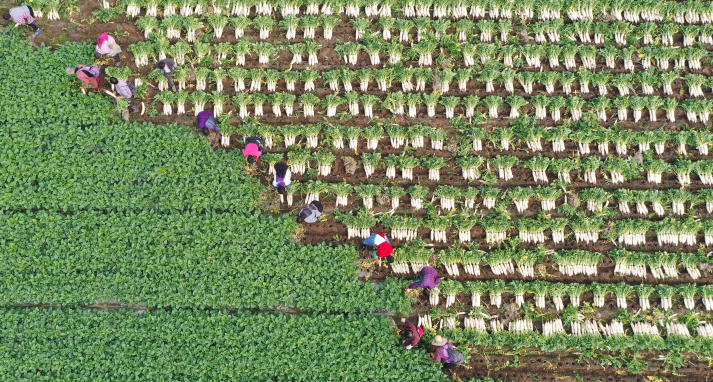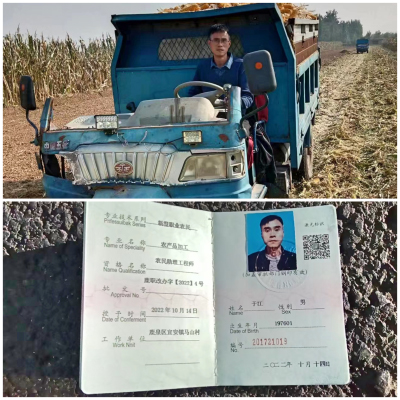| China |
| Getting the job done | |
|
|
 Villagers harvest white radishes at a vegetable farm in Shahe Village, Sichuan Province, on November 18, 2022 (XINHUA)
In mid-October 2022, Yu Jiang, a farmer in Mashan Village of Shijiazhuang City in Hebei Province, became one of the province's first two farmers to receive a professional accreditation in agriculture. Until recently, accreditations in agriculture were only awarded to researchers, technicians and educators in agriculture-related institutions. Offering accreditations to farmers and farm workers is part of a national plan to help them thrive on the land. Yu said he feels encouraged after receiving his accreditation as an assistant agricultural engineer. "I will continue to dig deeper and work harder to obtain higher levels of accreditation," the 47-year-old told Beijing Review. Getting recognition After graduating from a technical secondary school at the age of 16, Yu once worked as a fertilizer salesman. Being aware of China's rapidly increasing policy support for agriculture, Yu decided to return to his home village to work the land in 2011. At first, he farmed by himself on a small plot of land. However, he soon came to realize he could increase his income by cooperating with other farmers and encouraged his fellow villagers to form cooperatives, pool resources and create produce chains, including opening a factory to turn wheat into flour and noodles. He began building his knowledge on farming, technology use, marketing and policy. And as he did that, Yu and his fellow farmers opened more sales channels and increased the popularity of their produce. The businesses have helped more than 100 villagers increase their annual incomes by around 50 percent. Early last year, Yu learned that farmers can apply to the local human resources authority to become accredited in their fields and applied for accreditation as an assistant agricultural engineer. After being assessed on his theoretical knowledge and the practical skills he had gained over the years, he was awarded the accreditation. Yu said he not only plans to work toward his next qualification, but also plans to sit the college entrance exam to further his studies. In China, people engaged in professional work related to culture, education, science and technology, usually have professional accreditations, given by government departments as an indication of their skill level. They are usually evaluated according to their educational background, expertise, and research achievements, or on the basis of examinations. Obtaining these accreditations often leads to higher income and higher status within their field. The accreditation system is now benefiting farmers, a group not traditionally associated with educational attainment. Farmers are evaluated on their ability to use modern technologies, the socioeconomic performance of their agricultural activities, whether they set an example for others or help other farmers explore new ways of profitable and sustainable agribusinesses, as well as more generally, their contribution to rural development. Agriculture and farming account for very little of the assessed criteria. The introduction of the accreditations is part of the rapid agricultural development in China, which is increasing the transformative role of farmers. Their work scope is expanding, covering new areas like rural tourism, e-commerce and the promotion of traditional rural intangible cultural heritage. The accreditations are divided into three levels, junior (assistant), secondary and senior, similar to the classification of other professional accreditations. Different regions have developed their own specific criteria for each accreditation based on local conditions. Li Zongguang is a farmer in Nongan County in Jilin, a province in northeast China that is home to particularly fertile soil. Known as black soil or chernozem soil, and found across much of China's northeastern provinces, this soil produces about one quarter of the country's total grain output, making it crucial to securing the country's food basket. Unfortunately, the chernozem layer is thinning out due to years of excessive reclamation, fertilizer overuse and ineffective management, which have also caused the degeneration of the black soil and eroded the soil's nutrients. A series of measures have been adopted to encourage farmers to protect it. Over the past decade, Li has designed a crop management plan that can both protect the soil and reduce inputs by farmers. The method was widely adopted throughout the region and yielded tangible results. He received the senior professional accreditation from the provincial department of human resources and social security last year. Last year was the second year that Jilin offered accreditation to its farmers, and over 300 farmers have so far received the same accreditation as Li. In some areas of China, accreditation has been given to farmers for more than a decade. In 2007, Shanxi Province announced that it would divide its agricultural technicians into four grades, according to their farming knowledge and work experience. Those who are qualified for a professional title will receive financial support for their farming work and technical training. Several other provinces have also taken the lead in offering levels of accreditation to farmers. "The workforce is the first resource for rural revitalization," Long Yuebo, a researcher at the Research Institute of Peasant Issues at the China Agricultural University, told Beijing Review. "Making good use of the human resource evaluation system is crucial for promoting the transformation of modern farmers and cultivating a strong rural professional team."  Yu Jiang, a farmer in Mashan Village in Shijiazhuang City, Hebei Province, and his accreditation of assistant agricultural engineer (COURTESY PHOTO)
More encouragement The 2021 national census data showed China has more than 500 million people living in its less developed rural areas. They either work in agriculture or have family members who do so. Agriculture in China is often characterized by small-scale farming because of limited farm sizes. In recent years, the expansion of mechanized, large-scale farming and supporting policies have helped farmers work more efficiently, however, most of them still earn low incomes. In 2017, China proposed a rural revitalization strategy as a key move to accelerate the modernization of agriculture and rural areas, and has since adopted a host of policies to chart the roadmap for rural revitalization. Under this strategy, farmers have been increasing their skills and knowledge, bringing vitality to China's rural economic development. As part of this campaign, professional accreditations serve to motivate farmers. "Offering accreditation to farmers helps stimulate the development of human resources in the agriculture sector, and improve farmers' enthusiasm and initiative to learn and master modern agricultural science and technology for building a new countryside and promoting rural revitalization," Zhang Xinglong, another accreditation holder from Dehui, Jilin, told Jilin Daily. "Whether the role of the accreditation system can be maximized depends on the degree of social recognition it receives," Tong Tian, a researcher with the Chinese Academy of Labor and Social Security, explained. He believes authorities must ensure the accreditations bring tangible outcomes to farmers' career development. Anning in Yunnan Province has awarded more than 2,000 accreditations in animal husbandry, crops growing and irrigation. Each year, every accredited farmer receives 300 to 400 yuan ($43 to 57) in government subsidies for agricultural production and related activities. Authorities in Fuzhou, Jiangxi Province, have promised recipients will be prioritized for enrollment in training programs and for other government support. Yu said after he was certified, he gained even more support from the local government to help him expand his business. Recently, he was invited to meet with experts to share his future plans and receive suggestions and advice—an experience he described as very rewarding. Copyedited by G.P. Wilson Comments to luyan@cicgamericas.com |
|
||||||||||||||||||||||||||||
|